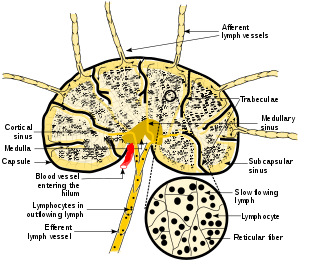Related Research Articles

Lymphedema, also known as lymphoedema and lymphatic edema, is a condition of localized swelling caused by a compromised lymphatic system. The lymphatic system functions as a critical portion of the body's immune system and returns interstitial fluid to the bloodstream. Lymphedema is most frequently a complication of cancer treatment or parasitic infections, but it can also be seen in a number of genetic disorders. Though incurable and progressive, a number of treatments can improve symptoms. Tissues with lymphedema are at high risk of infection because the lymphatic system has been compromised.

The lymphatic system, or lymphoid system, is an organ system in vertebrates that is part of the circulatory system and the immune system. It is made up of a large network of lymph, lymphatic vessels, lymph nodes, lymphatic or lymphoid organs, and lymphoid tissues. The vessels carry a clear fluid called lymph towards the heart.

A lymph node, or lymph gland, is a kidney-shaped organ of the lymphatic system, and the adaptive immune system. A large number of lymph nodes are linked throughout the body by the lymphatic vessels. They are major sites of lymphocytes that include B and T cells. Lymph nodes are important for the proper functioning of the immune system, acting as filters for foreign particles including cancer cells, but have no detoxification function.

Metastasis is a pathogenic agent's spread from an initial or primary site to a different or secondary site within the host's body; the term is typically used when referring to metastasis by a cancerous tumor. The newly pathological sites, then, are metastases (mets). It is generally distinguished from cancer invasion, which is the direct extension and penetration by cancer cells into neighboring tissues.

Laryngeal cancers are mostly squamous-cell carcinomas, reflecting their origin from the epithelium of the larynx.
The TNM Classification of Malignant Tumors (TNM) is a globally recognised standard for classifying the extent of spread of cancer. It is a classification system of the anatomical extent of tumor cancers. It has gained wide international acceptance for many solid tumor cancers, but is not applicable to leukaemia and tumors of the central nervous system. Most common tumors have their own TNM classification. Sometimes also described as the AJCC system.
Cancer staging is the process of determining the extent to which a cancer has developed by growing and spreading. Contemporary practice is to assign a number from I to IV to a cancer, with I being an isolated cancer and IV being a cancer that has spread to the limit of what the assessment measures. The stage generally takes into account the size of a tumor, whether it has invaded adjacent organs, how many regional (nearby) lymph nodes it has spread to, and whether it has appeared in more distant locations (metastasized).
Ann Arbor staging is the staging system for lymphomas, both in Hodgkin's lymphoma and non-Hodgkin lymphoma. It was initially developed for Hodgkin's, but has some use in NHL. It has roughly the same function as TNM staging in solid tumors.

The sentinel lymph node is the hypothetical first lymph node or group of nodes draining a cancer. In case of established cancerous dissemination it is postulated that the sentinel lymph node/s is/are the target organs primarily reached by metastasizing cancer cells from the tumor.
Prostate cancer staging is the process by which physicians categorize the risk of cancer having spread beyond the prostate, or equivalently, the probability of being cured with local therapies such as surgery or radiation. Once patients are placed in prognostic categories, this information can contribute to the selection of an optimal approach to treatment. Prostate cancer stage can be assessed by either clinical or pathological staging methods. Clinical staging usually occurs before the first treatment and tumour presence is determined through imaging and rectal examination, while pathological staging is done after treatment once a biopsy is performed or the prostate is removed by looking at the cell types within the sample.

Radical retropubic prostatectomy is a surgical procedure in which the prostate gland is removed through an incision in the abdomen. It is most often used to treat individuals who have early prostate cancer. Radical retropubic prostatectomy can be performed under general, spinal, or epidural anesthesia and requires blood transfusion less than one-fifth of the time. Radical retropubic prostatectomy is associated with complications such as urinary incontinence and impotence, but these outcomes are related to a combination of individual patient anatomy, surgical technique, and the experience and skill of the surgeon.

Cervical lymph nodes are lymph nodes found in the neck. Of the 800 lymph nodes in the human body, 300 are in the neck. Cervical lymph nodes are subject to a number of different pathological conditions including tumours, infection and inflammation.

Vulvar cancer is a cancer of the vulva, the outer portion of the female genitals. It most commonly affects the labia majora. Less often, the labia minora, clitoris, or vaginal glands are affected. Symptoms include a lump, itchiness, changes in the skin, or bleeding from the vulva.

The axillary lymph nodes or armpit lymph nodes are lymph nodes in the human armpit. Between 20 and 49 in number, they drain lymph vessels from the lateral quadrants of the breast, the superficial lymph vessels from thin walls of the chest and the abdomen above the level of the navel, and the vessels from the upper limb. They are divided in several groups according to their location in the armpit. These lymph nodes are clinically significant in breast cancer, and metastases from the breast to the axillary lymph nodes are considered in the staging of the disease.
Cancer of unknown primary origin (CUP) is a cancer that is determined to be at the metastatic stage at the time of diagnosis, but a primary tumor cannot be identified. A diagnosis of CUP requires a clinical picture consistent with metastatic disease and one or more biopsy results inconsistent with a tumor cancer
Lung cancer staging is the assessment of the extent to which a lung cancer has spread from its original source. As with most cancers, staging is an important determinant of treatment and prognosis. In general, more advanced stages of cancer are less amenable to treatment and have a worse prognosis.

Male breast cancer is a rare cancer in males that originates from the breast. Many males with breast cancer have inherited a BRCA mutation, but there are other causes, including alcohol use disorder and exposure to certain hormones and ionizing radiation.
A urogenital pelvic malignancy is a regional lymph node involvement in urogenital malignancies is a significant radiologic finding, with important implications for treatment and prognosis. Male urogenital pelvic cancers commonly spread to iliopelvic or retroperitoneal lymph nodes by following pathways of normal lymphatic drainage from the pelvic organs. The most likely pathway of nodal spread depends on the tumour location in the prostate, penis, testes, or bladder and whether surgery or other therapy has disrupted normal lymphatic drainage from the tumour site; knowledge of both factors is needed for accurate disease staging. At present, lymph node status is most often assessed with standard anatomic imaging techniques such as multidetector computed tomography or magnetic resonance imaging (MRI). However, the detection of nodal disease with these techniques is reliant on lymph node size and morphological characteristics, criteria that provide limited diagnostic specificity. Functional imaging techniques, such as diffusion-weighted MRI performed with or without a lymphotropic contrast agent and positron emission tomography, may allow a more accurate nodal assessment based on molecular or physiologic activity.
Colon cancer staging is an estimate of the amount of penetration of a particular cancer. It is performed for diagnostic and research purposes, and to determine the best method of treatment. The systems for staging colorectal cancers depend on the extent of local invasion, the degree of lymph node involvement and whether there is distant metastasis.

Piflufolastat F-18, sold under the brand name Pylarify, is a radioactive diagnostic agent used for positron emission tomography (PET) imaging. It is given by intravenous injection.
References
- ABCD rating in NCI Dictionary from PDQ (2004). Verified availability 2005-03-25.